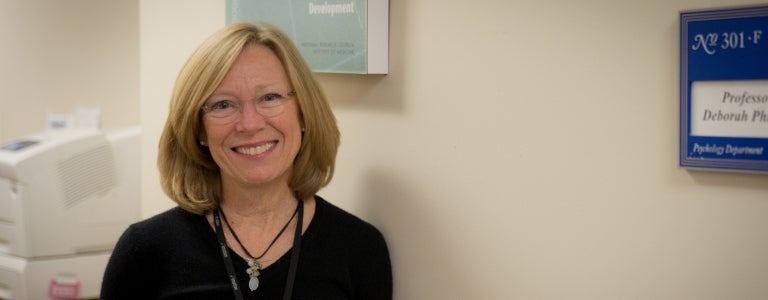Bringing Early Education to the National Spotlight

Professor of Psychology Deborah Phillips was recently appointed to the Board of Directors of the National Board for Education Sciences. Photo by Tess O’Connor.
November 24, 2014—In early October, President Obama announced several intended nominees for key administration posts—and the Department of Psychology’s Dr. Deborah Phillips was on the list. Phillips will serve as a member of the Board of Directors of the National Board for Education Sciences.
The 15-member board oversees the research efforts of the Department of Education, helping to establish funding priorities and data collection activities about the overall status of education in the United States. The board also issues an annual report to Congress on the effectiveness of the Department of Education’s research endeavors.
“It helps set the path for where the department should be focusing its research and what it should be doing with the results,” explained Phillips.
While the appointment is a thrilling opportunity for her both personally and professionally, Phillips says the real opportunity exists for her field and areas of specialization: early childhood education and early childhood development.
“Until two years ago, we’d never heard the words ‘early education’ in a State of the Union address,” Phillips said. “This is a case where the bully pulpit is a very important role. And [President Obama] has signaled to the nation that this is an issue of public concern and interest. It’s a very unique moment.”
This means Phillips will have a chance to advocate for what priorities should be emphasized in education. “Any time you’re advocating for little children, it’s an uphill battle,” Phillips said. A well-versed early childhood education expert, Phillips has worked in a variety of environments, including the National Association for the Education of Young Children, Capitol Hill, and the National Academy of Sciences.
“My career has been focused on the same set of issues from different vantage points, and each position has allowed me to really get to know the whole array of perspectives that bear on these issues of early education,” Phillips said.
Early childhood education is so crucial because it parallels early childhood development. The most rapid period of synaptic brain development—the forming of connections within the brain—occurs in the first five years of life, Phillips says. These connections allow our brains to learn how to think, plan, and organize information.
“It’s not that these connections are laid down in cement,” Phillips explained, “but they do provide either a strong foundation or a weak foundation for everything that follows.” Additionally, Phillips says, these foundations are important because the “achievement gap” emerges by 18 months of age. Achievement gaps refer to the disparity of educational measures and academic performance between groups of students; closing these gaps has been on the national radar for several years.
“The role of early education in this country—as it is for all education—is to create equal opportunity for all children, regardless of where they’re born, what their circumstances are, whether they are “typically developing” or have disabilities, what language they speak, or what country their parents are from,” Phillips said.
A key to improving early childhood education is understanding and recognizing the role of its workforce. Often misunderstood as “easy” or “mothering” positions, the job of an early childhood educator is extremely important in shaping the trajectory of students’ learning capabilities.
“Brain development is a hard concept to grasp because so much of what goes on is not immediately obvious. So a child who is very stress-reactive as a result of sitting in a classroom may seem to be okay, but isn’t absorbing a thing. It’s very hard to see, and the skill of the teachers is to see those things underneath [the] surface,” Phillips explained.
Phillips hopes to see changes in the way early educators are compensated. “We’ve recognized the importance of early education, yet somehow we’ve failed to recognize the importance of those who provide the education,” she said.
But issues like these are precisely the reason that Phillips is excited to begin her work with the board. Around the country, numerous referendums have been passed to dedicate more funds to preschool education, which Phillips says is an “extremely promising trend.” Many cities are actively trying to improve their early education systems, and the growing recognition of early education itself has led to increased resources for professional development and coaching for educators.
“I think the time has come,” Phillips said. “The country is very much heading toward a day when four year olds will be part of the education system. And hopefully, it will be a system infused with all that we know about childhood development.”
For her part, Phillips will bring her passion for these issues to her position as a board member.
“There will be people who represent various forms of education, people from a variety of political persuasions, people who want to see funds going to institutions in their own states,” she said. “There will be some level of debate, and that’s appropriate. As the ‘little kids’ advocate, I’ll be ready to speak extra loudly.”
More about Deborah Phillips
Earlier this month, Deborah Phillips and her colleagues Marcy Whitebook and Carollee Howes released the comprehensive report, Worthy Work, STILL Unlivable Wages: The Early Childhood Workforce 25 Years after the National Child Care Staffing Study. Published in conjunction with the Center for the Study of Child Care Employment, the report compares today’s early childhood teaching workforce to what it was 25 years ago.
Phillips has also received funding from Georgetown’s Reflective Engagement Initiative, through which she and Dr. Anna Johnson work to bring together researchers and decision-makers from cities and states that are building or expanding their pre-K education systems. With the group’s ideas and feedback, Phillips and Johnson hope to generate a collective body of evaluation evidence that will help improve pre-K education systems in the coming years.